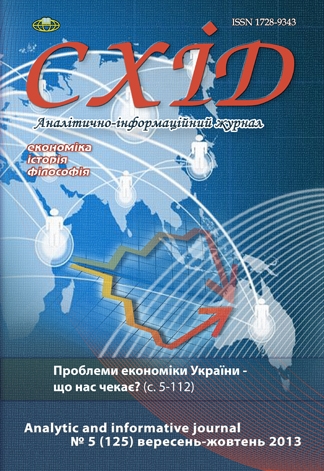Principles of social responsibility in small and medium business
DOI:
https://doi.org/10.21847/1728-9343.2013.5(125).19005Keywords:
CSR, social responsibility, small and medium business, ISO 26000 standardAbstract
In the article the possibility of application of the principles of conducting socially responsible business in format of small and medium-sized enterprises is considered. For this purpose preconditions of the one-sided relation to social responsibility as to a prerogative of exclusively large companies are briefly analyzed. The features of the small companies, allowing them successfully to use positive practice in the sphere of CSR, applied at the large enterprises, are considered. As scopes of the principles of CSR some provisions of the ISO 26000:2010 standard "Guidance on social responsibility" are used. From 7 areas, mentioned in this manual, the author considers only 5, which adequately allow to estimate, whether business is responsible, namely:
1. Labor relations;
2. Relationships with consumers;
3. Environment;
4. Participation in society life;
5. Relationships with partners.
According to the author, these 5 criteria are quite enough to judge level of social responsibility at the enterprise, considering specifics of development of business on the former Soviet Union. By results of the analysis conclusions about possibility of small and medium-sized enterprises to correspond to criteria of socially responsible company are drawn. In the course of the analysis it is possible to find recommendations about approach of practical management to requirements of current trends of business management.Downloads
References
Стандарт ISO 26000:2010 "Руководство по социальной ответственности".
Baumgartner R. J. The relationship between Sustainable Development and Corporate Social Responsibility / Dr. Rupert J. Baumgartner, Daniela Ebner // Corporate Responsibility Research Conference. - 2006. - 4th-5th September, Dublin.
Baumgartner R. J. Sustainable Development in Companies: An international survey / Dr. Rupert J. Baumgartner, Daniela Ebner // IAMOT 2005: Productivity Enhancement for Social Advance: The Role of Management of Technology. - Vienna, Austria.
McWilliams A. Corporate social responsibility: a theory of the firm perspective / A. McWilliams, D. Siegel // Academy of Management Review. - 2001. - № 26. - Рр. 117-27.
Мачёк Е. С. Социально ответственный бизнес. Украинские реалии / Е. С. Мачек // Ваш Бизнес. - 2013. - № 2.
Брюховецкая Н. Е. Социальная ответственность предприятий в условиях рыночных отношений / Н. Е. Брюховецкая, И. П. Булеев // Научные труды ДонНТУ. Серия: экономическая. - 2008. - Выпуск 34-2.
Morimoto R. Corporate Social Responsibility Audit: From Theory to Practice / R. Morimoto // Journal of Business Ethics. - 2006. - № 62. - Рр. 315-325.
Cramer J. Making Sense of Corporate Social Responsibility / J. Cramer // Journal of Business Ethics. - 2004. - № 55 (2). - Pр. 215-222.
Husted B. Corporate social responsibility in the multinational enterprise: strategic and institutional approaches / B. Husted, D. B. Allen // Journal of International Business Studies. - 2006. - № 37. - Pр. 838-849.
Bansal P. Why companies go green: a model of ecological responsiveness / P. Bansal, K. Roth // Academy of Management Journal. - 2000. -№ 43. - Рр. 717-736.
Knox S. Corporate Social Responsibility: Exploring Stakeholder Relationships and Programme Reporting across Leading FTSE Companies / Knox S. et al. // Journal of Business Ethics. - 2005. - № 61. - Рр. 7-28.
Нефинансовые отчеты украинских компаний [Електронний ресурс]. - Режим доступу : http://www.csrjournal.com/liveexperience/socreports/kso-otchetu/socreportsua/.
REFERENCES
ISO 26000:2010 standard «Guidance on social responsibility».
Dr. Rupert J. Baumgartner, Daniela Ebner (2006), The relationship between Sustainable Development and Corporate Social Responsibility, Corporate Responsibility Research Conference, 4th-5th September, Dublin (engl).
Baumgartner R. J., Ebner D. (2005), Sustainable Development in Companies: An international survey, IAMOT 2005: Productivity Enhancement for Social Advance: The Role of Management of Technology, Vienna, Austria (engl).
McWilliams A., Siegel D. (2001), Corporate social responsibility: a theory of the firm perspective, Academy of Management Review, 26, 117-27 (engl).
Machok E. S. (2013), Socially responsible business. Ukrainian realities, Vash Biznes, №2 (rus).
Brukhovetskaya N. Ye., Buleyev I. P. (2008), The social responsibility of enterprises in market conditions, Scientific papers of Donetsk National Technical University, series: economical, issue 34-2 (rus).
Morimoto R. (2006), Corporate Social Responsibility Audit: From Theory to Practice, Journal of Business Ethics, №62, pp. 315-325 (engl).
Cramer J. (2004), Making Sense of Corporate Social Responsibility, Journal of Business Ethics, №55(2), pp. 215-222 (engl).
Husted B., Allen D. B. (2006), Corporate social responsibility in the multinational enterprise: strategic and institutional approaches, Journal of International Business Studies, №37, pp.838-849 (engl).
Bansal P., Roth K. (2000), Why companies go green: a model of ecological responsiveness, Academy of Management Journal, №43, pp. 717-736 (engl).
Knox S. et al. (2005), Corporate Social Responsibility: Exploring Stakeholder Relationships and Programme Reporting across Leading FTSE Companies, Journal of Business Ethics, №61, pp. 7-28 (engl).
Ukrainian non-financial reports of companies, available at: http://www.csrjournal.com/liveexperience/socreports/kso-otchetu/socreportsua/.
Downloads
Published
How to Cite
Issue
Section
License
Copyright (c) 2013 Evgeniy Machok

This work is licensed under a Creative Commons Attribution-NonCommercial-NoDerivatives 4.0 International License.
1. Authors bear responsibility for the accuracy of facts, quotations, numbers and names used.
2. Manuscripts are not sent back.
3. The publisher does not always agree with the authors' opinion.
4. The authors reserve the right to authorship of the work and pass the first publication right of this work to the journal under the terms of a Creative Commons Attribution-NonCommercial-NoDerivatives 4.0 International License. This license allows others to distribute (copy) the published work for non-commercial purposes, provided there is mandatory attribution to its authors and a link to the first publication in our journal.
5. The authors have the right to conclude separate supplement agreements that relate to non-exclusive work distribution in the form in which it has been published by the journal (for example, to upload the work to the online storage of the journal or publish it as part of a monograph), provided that the reference to the first publication of the work in this journal is included.

